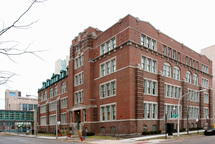
Another student had accused Redding of carrying ibuprofen, for which the school required prior permission to be allowed on campus.
During the strip-search, which was conducted in the school nurse's office, Redding was required to remove all her outer clothing and expose her breasts and pelvic area by pulling her underclothes away from her body.
No pills were found in either that search or an earlier search of her backpack.
"They forced her to reveal her breasts and genital area," Adam Wolf, the Redding family's lawyer, told the Supreme Court justices.
"It was an unfair search and a traumatic event. She thinks about it every day," Wolf said after the hearing, which Redding attended with her mother, April.
The Reddings sued the school, saying the strip-search violated the teenager's rights under the US constitution's Fourth Amendment, which guards against unreasonable searches and seizures.
A district court judge ruled in the first instance in favor of the school district and officials, but that decision was reversed by an appeal court, which found in favor of Savana Redding.
Matthew Wright, a lawyer for the school district, told the Supreme Court justices on Tuesday that the strip-search had been deemed necessary after another student at the school had had an adverse reaction to some pills he had taken.
And while the justices appeared ill at ease with the idea of students being strip-searched, they were also acutely aware of the dangers posed to teens by readily available drugs.
Justice David Souter suggested there should be a "sliding scale of risk" when it comes to searching students.
School officials would assess whether "sickness or death" was at stake and could strip-search students if their fears for the child's health and well-being were strong enough.
"If the school official's thought process was 'I'd rather have a kid embarrassed rather than some other kid dead,' isn't that reasonable under the Fourth Amendment?" Souter said.
But, he added: "If we hold in your favor, the next school would go for a cavity search and would see no legal basis to say it's not correct."
Justice Ruth Bader Ginsberg chided the school officials, saying: "A strip-search is quite different than a search of a purse.
"They acted on a student tip, no questions asked at all," she added.
On the steps of the court after the hearing, now 19-year-old Redding, who is studying psychology at college and wants to become a counselor, told reporters: "Some things they said made me mad and others I was glad to hear."
A decision in the case is not expected for several months.
---------------------------------------------------------------------------------------------------
During the strip-search, which was conducted in the school nurse's office, Redding was required to remove all her outer clothing and expose her breasts and pelvic area by pulling her underclothes away from her body.
No pills were found in either that search or an earlier search of her backpack.
"They forced her to reveal her breasts and genital area," Adam Wolf, the Redding family's lawyer, told the Supreme Court justices.
"It was an unfair search and a traumatic event. She thinks about it every day," Wolf said after the hearing, which Redding attended with her mother, April.
The Reddings sued the school, saying the strip-search violated the teenager's rights under the US constitution's Fourth Amendment, which guards against unreasonable searches and seizures.
A district court judge ruled in the first instance in favor of the school district and officials, but that decision was reversed by an appeal court, which found in favor of Savana Redding.
Matthew Wright, a lawyer for the school district, told the Supreme Court justices on Tuesday that the strip-search had been deemed necessary after another student at the school had had an adverse reaction to some pills he had taken.
And while the justices appeared ill at ease with the idea of students being strip-searched, they were also acutely aware of the dangers posed to teens by readily available drugs.
Justice David Souter suggested there should be a "sliding scale of risk" when it comes to searching students.
School officials would assess whether "sickness or death" was at stake and could strip-search students if their fears for the child's health and well-being were strong enough.
"If the school official's thought process was 'I'd rather have a kid embarrassed rather than some other kid dead,' isn't that reasonable under the Fourth Amendment?" Souter said.
But, he added: "If we hold in your favor, the next school would go for a cavity search and would see no legal basis to say it's not correct."
Justice Ruth Bader Ginsberg chided the school officials, saying: "A strip-search is quite different than a search of a purse.
"They acted on a student tip, no questions asked at all," she added.
On the steps of the court after the hearing, now 19-year-old Redding, who is studying psychology at college and wants to become a counselor, told reporters: "Some things they said made me mad and others I was glad to hear."
A decision in the case is not expected for several months.
---------------------------------------------------------------------------------------------------









 Home
Home Politics
Politics









